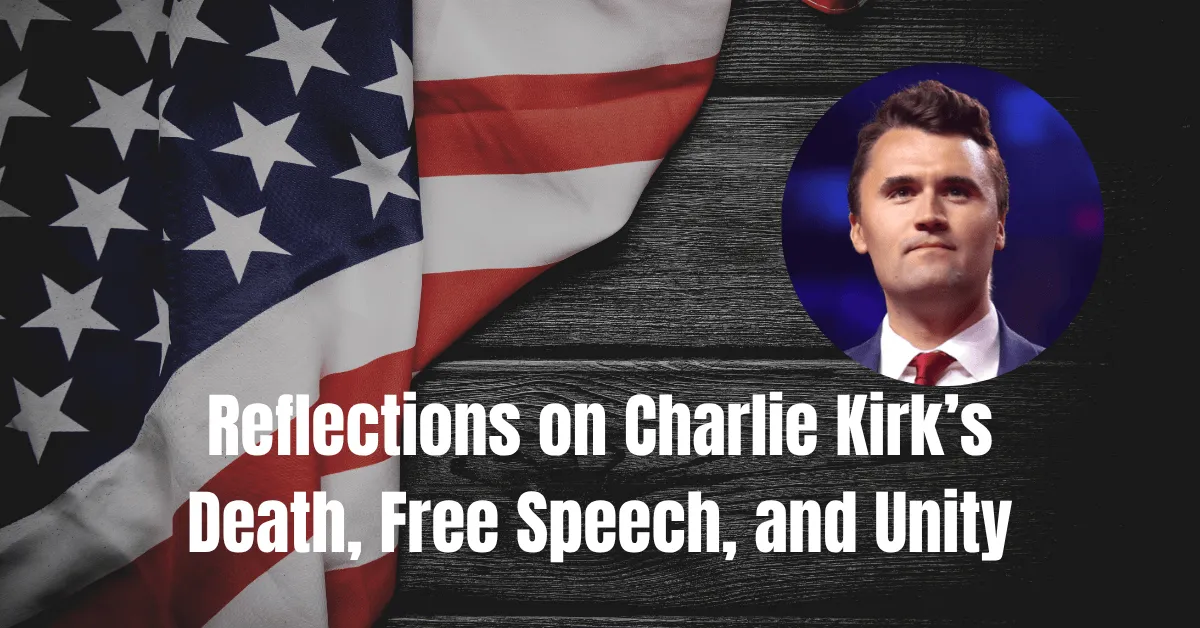
Reflections on Charlie Kirk’s Death, Free Speech, and Unity
Are you feeling like the world has forgotten how to simply listen? To hold space for another person’s words without rushing to attack? This week, as I reflect on the death of Charlie Kirk, my heart feels heavy. Before we debate his ideas, let’s not forget—children lost their father, a wife lost her husband, and the body of Christ lost a brother. That grief is sacred, and it deserves a pause.
Charlie’s passing hits me as a mother of sons his age, as a believer grieving the loss of a brother in Christ, and as a citizen who fears what happens when disagreement no longer leads to debate but to violence. Whether you agreed with Charlie’s views or opposed them, we can all agree on this: no one should lose their life for their words. Free speech is the heartbeat of a healthy nation.
In a world where harsh words stir up anger and division, we are desperately in need of gentle answers, civil discourse, and a true north of truth.
The Grief of a Mother, Citizen, and Believer
As a mother, I look at my two sons and ache for Charlie’s children. They don’t yet understand why their father is gone. His wife carries a pain that words can’t touch. And for those of us watching, the grief reminds us how fragile life is—and how precious truth-tellers are.
As a libertarian-leaning citizen, I’m troubled. We live in a country where the Constitution guarantees free speech, but too often it feels like that freedom is under attack—both from external influences that pit “right” and “left” against each other, and from our own unwillingness to listen to one another. The words of Zechariah Chafee, Jr. ring louder than ever: “Your freedom ends where my nose begins.” (Chafee was an American judicial philosopher, civil libertarian, and advocate for free speech in the early 1900s). Civil discourse has to matter again.
As a Christian believer, my spirit mourns. Charlie was more than a debater—he was a passionate, articulate follower of Christ who used every platform to point people toward the cross. His earthly voice is gone, and the body of believers feels that void deeply. His example challenges us to carry on the work of truth, grace, and freedom.
The Fog of Truthiness
We live in what some call an age of “truthiness,” where feelings outweigh facts and everyone decides their own “truth.” But without a true north, we lose our way. For me, the Bible is that anchor: “If one member suffers, all suffer together” (1 Cor. 12:26). For ALL of us as American citizens, the Constitution should serve as a shared compass, reminding us that freedom and responsibility go hand in hand.
Charlie lived in that tension—passionate in debate, unwavering in conviction, yet rooted in faith. Debate was never about destroying the other side but about pursuing truth. Charlie wasn’t perfect—none of us are. But his courage to speak boldly and listen openly is something we can all learn from.
Even if you disagreed with his message, Charlie spoke what he believed to be the truth. And he gave every person who disagreed with him an opportunity to speak their viewpoint and try to convince him to change his own mind. And I've seen repeated times where he allowed himself to be corrected (for instance, when he commented about the ASL interpreters being a distraction during the wildfires; he accepted correction and publicly apologized). I watched him speak with grace and compassion to a person struggling with gender dysphoria and he commended the person for showing the bravery to share their story at the mic. Whether you agreed with him or not, he demonstrated how we can create time and space for civil discourse between opposing viewpoints.
For those of us who use God's Word as our true north compass, we believe that we are morally obligated to share God's truth with anyone who seems to have fallen under the spell of a lie. We ARE our brother's keeper. It is NOT loving to let someone wander into a deadly trap saying, "well, it's their choice and their freedom." That said, those conversations should probably be done compassionately, privately, and after prayer. Our job is to share the truth. It's up to them to decide whether to accept it. And afterward, we are to love them as our neighbor even if we disagree with what they do. We can love the WHO even if we can't accept the WHAT, just as God loves us sinners even while hating our sins.
Scripture Reflections
“A gentle answer turns away wrath, but a harsh word stirs up anger.” (Proverbs 15:1)
“Let every person be quick to hear, slow to speak, slow to anger.” (James 1:19)
“Where the Spirit of the Lord is, there is freedom.” (2 Corinthians 3:17)
These verses remind me that our response matters. In grief. In disagreement. In moments when we’re tempted to lash out instead of lean in.
Charlie Kirk’s death leaves us grieving as mothers, believers, and citizens. But it also leaves us with a challenge: to carry forward what mattered most to him. To stand for truth, even when it’s unpopular. To defend freedom, even when it’s messy. And to speak with conviction, seasoned with grace.
In this fog of division and discord, may we choose gentle answers over harsh words, truth over “truthiness,” and Christ as our ultimate true north.
I invite you to pray this week—for Charlie’s family, for our nation, and for the courage to be both bold and gentle in our own words. As you reflect this week, ask yourself: Am I quick to listen, slow to speak, and gentle in my words? May we each bring light into the fog.

